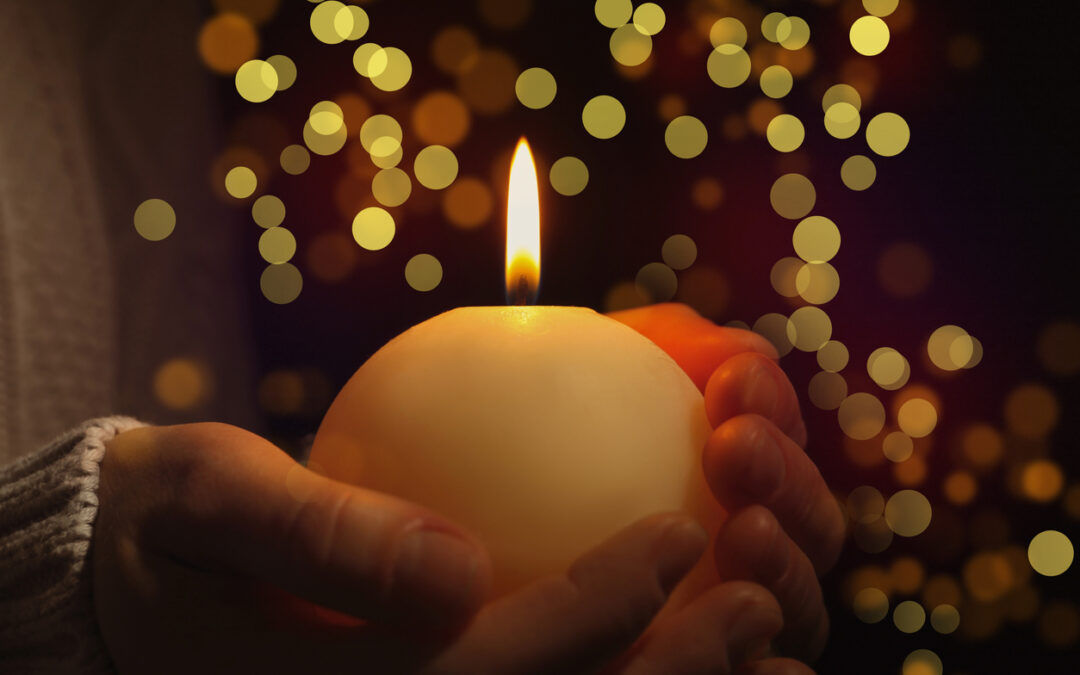Gratitude feels like the opposite of grief and yet the two interweave into a tapestry that looks like a mess on its backside but tells a beautiful story when displayed. And while struggling with grief over the holiday season, gratitude could be a comfort and coping skill. But it can be challenging to find gratitude in our grief, especially on holidays filled with tradition and celebration.
I’ve been thinking a lot about the intersection of grief and gratitude. This will be my first Thanksgiving without my dad.
The November holiday has never been consistent in my family. So many things about our gatherings change from year-to-year—sometimes we don’t even hold it on Thanksgiving Day. My oldest son has profound autism, and our celebrations often center around how he’s doing that year. Throw in siblings, in-laws and the normal ebbs and flows of life and Thanksgiving becomes a flexible feast.
But there have been some constants: turkey (of course), my Granny’s corn pudding recipe, football and my dad getting sentimental. For most of my adult life, he has said something similar to, “I might not be around for many more of these holidays.”
The sentence became a punchline. Each year, we teased my dad about it.
Until last year, when my dad was so sick that the words became more reality than refrain.
My dad died in February. I will always be grateful that we had time to say goodbye, that his final days gave us a chance to prepare for losing him. But the death of someone you love always leaves a gaping hole. I expect there will always be a gap, a sense of something missing for the rest of my life. But gratitude has slowly filled in the space that felt like a permanent chasm on the night he died.
After his death, I shrugged off condolences by reminding people that I had a loving, supportive father for 48 years of my life. I know that is a privilege many do not get. But that blessing also means that his absence has created a larger void.
Many of us will come to the Thanksgiving table with missing pieces, wounds and scars caused by grief. Some of us may find comfort in the traditions and celebrations of the season. For others, those traditions will provide sharp reminders of all that we have lost.
Our grief may be due to death. But it could also be lost relationships, faded dreams, ended careers, illness, wayward children. We may be grieving ahead of change that scares us.
Our grief may be filled with sadness, anger, stress, worry, anxiety. The holidays can compound those feelings.
Coping with Grief Over the Holidays
But there are some things we can do to cope with this season—and maybe even find some joy along the way:
- Acknowledge your feelings. You’ll see social media posts, advertisements and movies that focus on merriment. It’s OK to feel sad, angry, lonely and hurting when it seems like everyone around you is joyous.
- Make your traditions flexible. If you find yourself dreading a ritual or activity, it’s fine to skip it—yes, even if it’s something your family has done for generations.
- Take the easy way out. Don’t feel like cooking Thanksgiving dinner this year? Accept a loved one’s offer to help or order a turkey and the trimmings already cooked. Exhausted just thinking of holiday shopping? Try online shopping. Feeling overwhelmed by holiday decorating? Skip it.
- Honor your loved one. They were a part of your holiday traditions before, and they can be still. Light a candle, make a toast, hold a moment of silence or just take a moment to share your favorite memories.
- Seek support. Surround yourself with people who care about you. Find a support group or see a therapist. We offer an online, peer-led grief support group.
- Take care of yourself. Make sure you’re sleeping, eating healthy foods and avoiding unhealthy coping mechanisms.
- Reach out. Helping others during the holiday season can be a balm for grief.
- Practice gratitude. Write down things you’re grateful for, no matter how small. Download a printable gratitude journal page here.
Tips for Finding Gratitude in Grief
While everyone is talking about gratitude right now, you may struggle to find gratitude while grieving. Here are some thing you can do to help:
- Gratitude Journal: Write down one thing you are grateful for each day, no matter how small.
- Reflect on positive memories: Focus on cherished moments with the person you lost.
- Acknowledge support: Be thankful for the people who are there for you during your grief.
- Mindful practice: Incorporate mindfulness techniques to help you be present with your feelings, including both grief and gratitude. We have a video on creating mindfulness jars, which are a good way to take a few moments to relax.
- Small acts of kindness: Do something kind for yourself or someone else each day.
- Express gratitude to the deceased: Write a letter expressing your gratitude for their presence in your life.
- Accept your emotions: Allow yourself to feel both sadness and gratitude without judgment.

